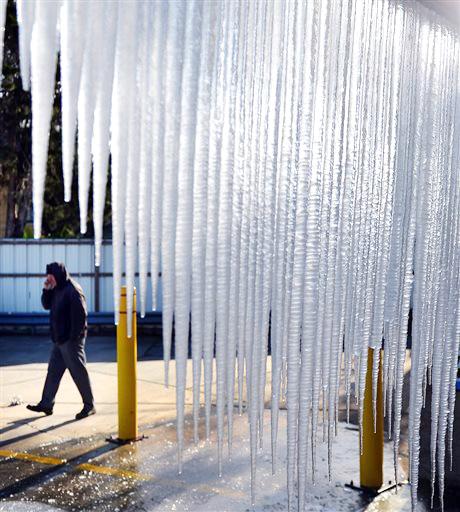WASHINGTON (AP) – We’ve become weather wimps.
As the world warms, the U.S. is getting less bitter cold spells like the one that gripped much of the nation during the week of Jan. 6. So when a deep freeze strikes, scientists say, it seems more unprecedented than it really is.
An Associated Press analysis of the daily national winter temperature shows that cold extremes have happened about once every four years since 1900.
Until recently.
When computer models estimated that the national average daily temperature for the lower 48 states dropped to 17.9 degrees on Jan. 6, it was the first deep freeze of that magnitude in 17 years, according to Greg Carbin, a warning coordinaton meteorologist for the National Oceanic and Atmospheric Administration.
“We expect to see a lengthening of time between cold air outbreaks due to a warming climate, but 17 years between outbreaks is probably partially due to an unusual amount of natural variability,” said Jeff Masters, meteorology director of the private firm Weather Underground. “I expect we’ll go far fewer than 17 years before seeing the next cold air outbreak of this intensity.
The stretch, from Jan. 13, 1997 to Jan. 6, is by far the longest the U.S. has gone without the national average plunging below 18 degrees, according to a database of daytime winter temperatures starting in January 1900.
“These types of events have actually become more infrequent than they were in the past,” said Carbin. “This is why there was such a big buzz because people have such short memories.”
The recent cold spell, which was triggered by a frigid air mass known as the polar vortex that wandered below normal, could also be related to a relatively new theory that may prove a weather wild card, said Jennifer Francis, a research professor with the Rutgers Institute of Marine and Coastal Sciences. Her theory, which has divided mainstream climate scientists, says that melting Arctic sea ice is changing polar weather, moving the jet stream and causing “more weirdness.”
Nine of 11 outside climate scientists and meteorologists who reviewed the data for the Associated Press said it showed that as the world warms from heat-trapping gas, spewed by the burning of fossil fuels, milder winters occur. The world is getting more warm extremes and fewer cold extremes, they said.
And the scientists dismiss global warming skeptics who claim one or two cold days somehow disproves climate change.
“When your hands are freezing off trying to scrape the ice off your car, it can be all too tempting to say, ‘Where’s global warming now? I could use a little of that!’ But you know what? It’s not as cold as it used to be anymore,” Texas Tech University climate scientist Katharine Hayhoe said in an email.
Many climate scientists say Americans are “weather weenies” who are forgetting what a truly cold winter is like.
“I think that people’s memory about climate is really terrible,” Texas A&M University climatologist Andrew Dessler wrote in an email. “So I think this cold event feels more extreme than it actually is because we’re just not used to really cold winters anymore.”






